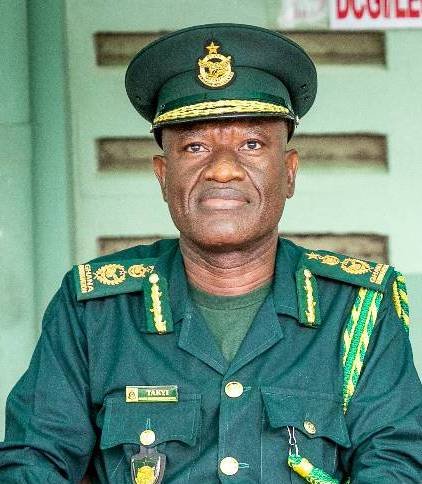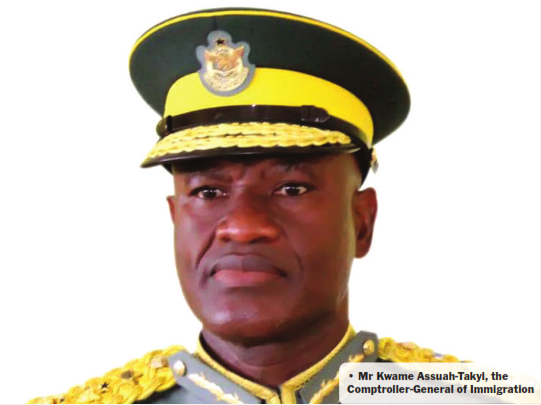News
Don’t harass, visitors on period of election …Comptroller-General cautions Immigration staff

The Comptroller-General of Immigration, Mr Kwame Asuah Takyi, (Esq.), has asked personnel of the service, especially those at the various borders of the country, not to harass people who travel in and outside of the country during the election period.
The advice is to stem reports that usually characterise immigration operations in border communities in such crucial moments.
He gave the advice at the 2024 Comptroller-General’s end-of-year games held at the McDan La Town Park on Friday.
It was under the theme “Kick for unity, sports for peaceful elections.”
According to Mr Assuah Takyi, It was important for personnel of the staff to behave professionally and live by the high standards required to ensure peace and tranquility at the border towns where elections would be ongoing.

“I want to remind you of the roles and responsibilities expected from you. Don’t take advantage of the upcoming general elections to harass visitors and passengers going in and out of the country.
“Perform your duties professionally as immigration officers and, where necessary, assist other security agencies to maintain peace, law, and order before, during, and after the elections.”
“Be apolitical because your services are to Ghana first and only, and not to any individual or political party. As officers in uniform, don’t put up behaviours that would question your professionalism.”
“This is not a call on immigration staff alone. All the security agencies are poised to display high standards of professionalism to ensure that Ghanaians vote in a peaceful atmosphere,” Mr Takyi said.
Flanked by three-time African best player and former captain of the Black Stars Abedi Ayew Pele, who was the special guest of honour, the Comptroller-General stated that as officers and men in uniform, their duty to the country was to maintain peace, law, and order and not to be involved in dubious or political activities.
“If any of you want to do politics, resign and hand over your uniform to the service and go. This information should go out there to our officers across the country.”
Mr Assuah Takyi urged members of the general public to behave responsibly to make the work of the security officers simple and peaceful while cautioning potential troublemakers to have a change of mind because that would not be tolerated.
“The National Elections Security Taskforce (NESTF) met the political parties on Thursday to reaffirm our commitment to professionalism, impartiality, and adherence to the rule of law.”
“Our actions will be impartial and guided by the law, and anyone who decides to violate the laid-down laws will be made to face the law.”
Mr Asuah Takyi urged all to operate within the confines of the law to ensure a successful and trouble-free election.
By Raymond Ackumey
News
Nkonya descendants coming home from Diaspora
From the ancestral hills of Nkonya, a global call to remembrance is rising.
This October, the quiet village of Kromo (now Tepo) will become the epicenter of a transcontinental memorial as Ghana and the United States jointly launch African Holocaust Month-a solemn tribute to the millions of African lives lost to the transatlantic slave trade.
Held annually on the second Saturday of October, the ceremony this time will unfold simultaneously in Kromo, Ghana, and Kentucky, USA, with commemorative benches placed facing each other across the Atlantic.
At exactly 4pm Ghana time, libations will be poured, wreaths laid, and names of the departed read aloud—restoring dignity to those whose stories were silenced by history.
But this is more than ritual. It is prophecy fulfilled. Kromo, once a thriving community along the slave route from Salaga, bears the scars of betrayal.
Oral history recounts a tragic moment when slave traders raided the village during a hunting absence, capturing youth aged 16 to 20—including a revered Queen mother and her attendants.
The grief-stricken community relocated, giving birth to present-day Tepo.
For generations, the people of Nkonya prayed that the Queen mother’s descendants would return—not just in body, but in royalty.
That prayer was answered in 2007, when Ur Aua Hehimetu Ra Enkamit, Paramount King of the Ausar Auset Society in Washington, D.C, USA, returned to Nkonya following a DNA test.
He was formerly known as Dr Lee Cook Jr.
A direct descendant of David Cook (e) of Kentucky, his lineage traces back through five generations to Edmon Cooke, whose roots are believed to pass through Kromo.
“This is not just a memorial— it’s a restoration of ancestral ties,” said Ur Aua Enkamit in a chat with The Spectator.
“Kromo is both literal and symbolic. Even if your ancestors didn’t pass through here, it represents every nameless place Africans were captured and marched toward the coast,” he emphasised.
The initiative invites all people of African descent—whether from Ghana, Jamaica, the U.S., or beyond—to participate.
He encouraged families to identify ancestral land for bench placement, submit names of deceased relatives for the reading, coordinate with diaspora kin for simultaneous ceremonies, and arrive in Nkonya before the event.
Benches, he stressed, would be provided in Kromo, with wreaths available upon request. Once placed, families need only return each year with names and offerings.
African Holocaust Month draws inspiration from Ida B. Wells, the pioneering journalist who in 1909 used the term “holocaust” to describe atrocities against African people—decades before its association with World War II.
This October, her words echo across oceans, as descendants reclaim memory, identity, and sacred ground.
From Kingsley E. Hope Kumasi
Join our WhatsApp Channel now!
https://whatsapp.com/channel/0029VbBElzjInlqHhl1aTU27

News
Assembly man shot dead in Aboabo

A wave of grief has swept through the Amansie West District over the fatal shooting of the Assembly Member for Aboabo, Samuel Danquah, during a violent clash between residents and armed military personnel at a mining site in Mpatuam on Tuesday.
Samuel Danquah was killed when military men opened fire on angry residents in Mpatuam. Two other people were also shot and are in hospital.
The trouble started on Monday, September 8, when local people said security guards from Asanko Mines killed a miner.
On Tuesday, hundreds of young people blocked the roads to the mining site, demanding justice for the dead man.
Danquah went to the scene to talk to the protesters and calm them down. But when soldiers arrived, they started shooting. Danquah was hit by a bullet and died at the hospital.
“Danquah came to help calm the situation,” said Kwame Sakyi, an Assembly Member for Mpatuam, who saw what happened. “He believed in talking through problems.”
After the shooting, the angry crowd set fire to vehicles and equipment belonging to the mining company. The whole area is now very tensed.
“The situation is out of hand,” Sakyi told reporters. “The youth are devastated. They feel unheard, unsafe, and betrayed. We’ve lost a respected leader and the people are demanding answers,” he added.
This is not the first time such troubles between mining companies and local communities in Ghana has been recorded. Many people living near mines say the companies make money from their land but give nothing back to them.
They complained that the mining is destroying their farms and water sources while they remain poor. When they protest, security forces often use force against them.
Sakyi is asking the government to investigate what happened and find out why soldiers shot at unarmed people. He wants to know why a respected community leader was killed while trying to make peace.
“While mining brings economic opportunities, communities continue to feel left out,” he explained, adding that, “We need better ways for people to talk about their problems without violence.”
Community leaders and civil society groups are also calling on the government to step in and prevent more violence in mining areas.
People who knew Danquah said he was always trying to help solve problems peacefully. His family and friends are shocked that he was killed while trying to prevent a commotion.
The funeral arrangements are being made while the community mourns a leader who died trying to serve his people.
Many opinion leaders believe the incident shows how dangerous the situation has become in Ghana’s mining areas, where conflicts between companies and communities are getting worse instead of better.
From Kingsley Hope, Kumasi
Join our WhatsApp Channel now!
https://whatsapp.com/channel/0029VbBElzjInlqHhl1aTU27












